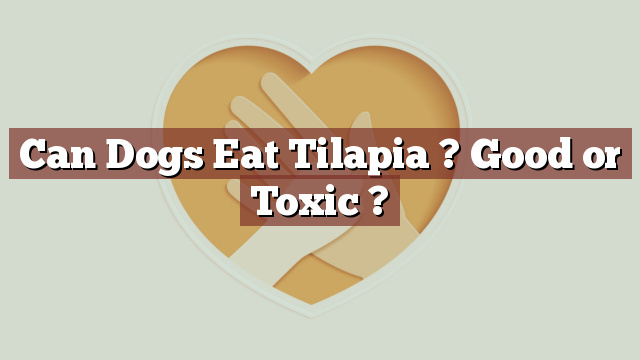Can Dogs Eat Tilapia? Good or Toxic?
Knowing what foods are safe for our pets is essential for their overall health and well-being. Among the many types of fish available, tilapia is a popular choice for its mild flavor and nutritional benefits. But can dogs eat tilapia? Is it good for them, or can it be toxic? Let’s explore the topic in detail to ensure we make informed decisions about what we feed our furry friends.
Nutritional Value of Tilapia for Dogs
Tilapia is a lean white fish that is low in calories and fat, making it a healthy protein source for humans. It is also rich in essential nutrients like omega-3 fatty acids, potassium, vitamin B12, and selenium. These nutrients contribute to heart health, promote brain function, and support a strong immune system. From a nutritional perspective, tilapia can provide similar benefits to dogs as it does to humans.
Is Tilapia Safe for Dogs to Eat?
Yes, dogs can eat tilapia. In fact, many commercial dog food brands include fish as an ingredient due to its numerous health benefits. Tilapia is generally considered safe for dogs, but it is important to prepare it properly. Dogs should only eat plain, cooked tilapia without any seasoning, breading, or added oils. These additional ingredients can be harmful to dogs and should be avoided.
It is worth noting that some dogs may have individual sensitivities or allergies to fish. If you are introducing tilapia to your dog’s diet for the first time, start with a small amount and monitor their reaction. Signs of an allergic reaction may include itching, vomiting, diarrhea, or difficulty breathing. If any of these symptoms occur, consult a veterinarian immediately.
Potential Risks and Benefits of Feeding Dogs Tilapia
Feeding dogs tilapia in moderation can have several benefits. The omega-3 fatty acids found in fish help support healthy skin and a shiny coat. They also have anti-inflammatory properties that can aid in reducing joint pain and inflammation in dogs, particularly those with arthritis.
However, there are a few potential risks associated with feeding dogs fish, including tilapia. Fish bones can pose a choking hazard or cause internal injuries if swallowed. Therefore, it is crucial to remove all bones before serving tilapia to your dog. Additionally, fish can sometimes contain environmental contaminants, such as mercury or polychlorinated biphenyls (PCBs). These toxins can accumulate in the fish’s fatty tissues and may be harmful to dogs if consumed in large quantities over time. Therefore, it is advisable to limit the amount of fish, including tilapia, in your dog’s diet.
What to Do If Your Dog Eats Tilapia
If your dog accidentally consumes tilapia, there is usually no cause for alarm. However, if your dog exhibits unusual symptoms or discomfort after eating tilapia, it is recommended to seek veterinary advice. A professional can determine if there are any underlying issues or if the symptoms are unrelated to the consumed fish. Prompt medical attention is crucial in case of an adverse reaction or if the dog has ingested tilapia with bones.
Conclusion: Can Dogs Eat Tilapia?
In conclusion, dogs can eat tilapia as long as it is plain, cooked, and boneless. It can provide a healthy dose of essential nutrients and omega-3 fatty acids, benefiting their overall health. However, it is important to keep in mind that individual dogs may have allergies or sensitivities to fish, so it is recommended to introduce tilapia gradually. Additionally, fish consumption should be in moderation to avoid potential exposure to environmental toxins. As always, if you have any concerns or questions about your dog’s diet, consult with a veterinarian for personalized advice and guidance.
Thank you for investing your time in exploring [page_title] on Can-Eat.org. Our goal is to provide readers like you with thorough and reliable information about various dietary topics. Each article, including [page_title], stems from diligent research and a passion for understanding the nuances of our food choices. We believe that knowledge is a vital step towards making informed and healthy decisions. However, while "[page_title]" sheds light on its specific topic, it's crucial to remember that everyone's body reacts differently to foods and dietary changes. What might be beneficial for one person could have different effects on another. Before you consider integrating suggestions or insights from "[page_title]" into your diet, it's always wise to consult with a nutritionist or healthcare professional. Their specialized knowledge ensures that you're making choices best suited to your individual health needs. As you navigate [page_title], be mindful of potential allergies, intolerances, or unique dietary requirements you may have. No singular article can capture the vast diversity of human health, and individualized guidance is invaluable. The content provided in [page_title] serves as a general guide. It is not, by any means, a substitute for personalized medical or nutritional advice. Your health should always be the top priority, and professional guidance is the best path forward. In your journey towards a balanced and nutritious lifestyle, we hope that [page_title] serves as a helpful stepping stone. Remember, informed decisions lead to healthier outcomes. Thank you for trusting Can-Eat.org. Continue exploring, learning, and prioritizing your health. Cheers to a well-informed and healthier future!

